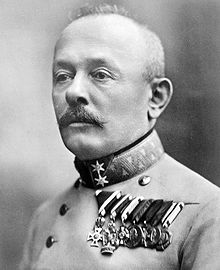Svetozar Boroević
| Svetozar Boroević von Bojna Svetozar Borojević |
|
|---|---|
 |
|
| Born |
13 December 1856 Umetić, Croatian Military Frontier, Austrian Empire (now Croatia) |
| Died | 23 May 1920 (aged 63) Klagenfurt, First Austrian Republic (now Austria) |
| Allegiance |
|
| Service/branch | Austro-Hungarian Army |
| Years of service | 1872–1918 |
| Rank | Field Marshal |
| Battles/wars | |
| Awards |
Military Merit Cross, Cross of the Order Star of Romania, Persian Order of the Sun and the Lion, Order of the Iron Crown, Knights' Cross of the Order of Leopold, Military Order of Maria Theresa |
K.u.k. Feldmarschall Svetozar Boroević (or Borojević) (13 December 1856 – 23 May 1920) was an Austro-Hungarian field marshal who was described as one of the finest defensive strategists of the First World War. He was given Austrian nobility as Baron Boroëvić von Bojna, and later rising to the rank of Field Marshal before the end of the First World War in 1918.
Boroević was born on 13 December 1856 in the village of Umetić, Croatian Military Frontier, Austrian Empire (present-day Croatia). His father Adam was a Grenzer (border guard) officer, his mother was Stana (née (pl. = noble) Kovarbašić von Zboriste). He was baptized in the Orthodox Church, most likely in the parish church in Mečenčani, where his father served.
Boroević was of Serb descent. Boroević himself stated once that he was a Croat and that Croatia was his homeland, while he is often simply called "Croatian".
He had a brother, Nikola, a colonel who also received Austrian noble status in 1917.
In 1889, he married Leontina von Rosner, a daughter of a late Austrian colonel, Friedrich Ritter von Rosner. The couple had one son, Friedrich Borojević von Bojna, named after his mother's father. The son died in 1918.
Boroević joined cadet school at the age of ten. After finishing grade school he moved to Kamenica and later Graz where he studied in military academies. He attended the Liebenau cadet school in 1875.
He advanced quickly through the ranks (corporal in 1872, lieutenant in 1875) and became a commander in the Croatian Home Guard, an equivalent to the Hungarian Honved and the Austrian Landwehr, defensive troops of parts of the Danube Monarchy, in times of peace not belonging to the Imperial & Royal Army. Before the First World War, he commanded the 42nd division of the Croatian Home Guard. In 1903 he was formally released from the Home Guard, already having been assigned to the Imperial & Royal Army in 1898. During war, the defensive troops were part of the Armed Forces commanded by the Supreme Army Command (Armeeoberkommando) and could be used at the front.
...
Wikipedia
